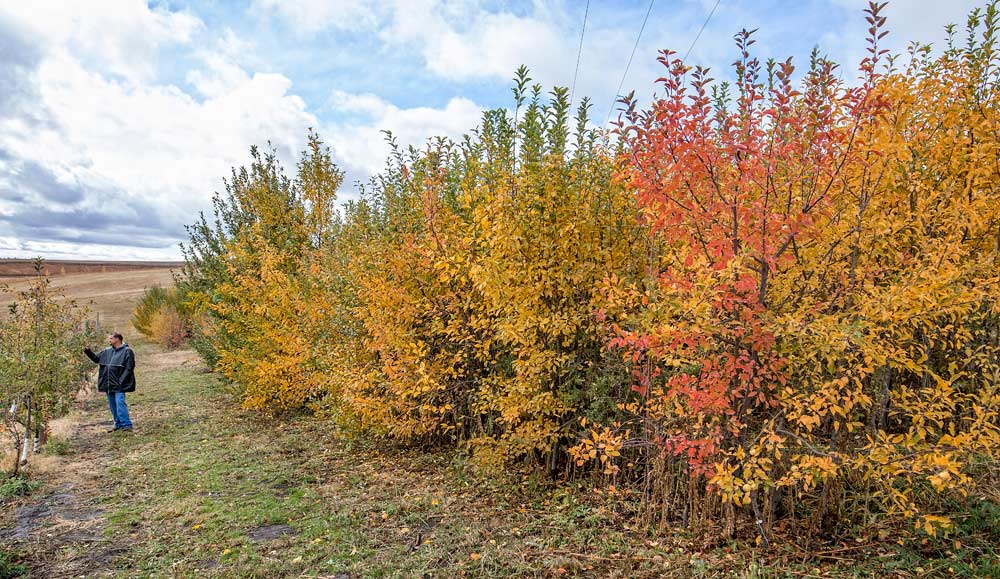
Tymon James, pauses at one of the many different apple varieties grown by Washington State University students at the Tukey Horticulture Orchard in Pullman, Washington, in October, 2017. The stand of trees on James’ right are Kazakhstani Malus sieversii seedlings that were raised by Gennaro Fazio at the Geneva, New York, USDA germplasm repository and donated to the WSU breeding program. These trees are the foundation of the student-led “Palouse Wild Cider Breeding Program.” (TJ Mullinax/Good Fruit Grower)
Turns out, Wenatchee is not Washington’s only apple breeding grounds.
A group of Washington State University students in Pullman — far away from the state’s vaunted commercial tree fruit orchards — are breeding cider apples, making spin-off use of a genetic repository planted to provide material for the more formal, celebrated breeding program that released WA 38, the newly released variety to be sold as Cosmic Crisp.
Instructor Cameron Peace, wanting to give his students hands-on training, helped them launch a program that crosses exotic and wild cultivars of apples for traits that might come in handy for local cider enthusiasts.
They call it the Palouse Wild Cider Breeding Program, and the students chose goals both modest and ambitious. First, they want to support hobby orchardists in the Palouse, the wheat-covered hills surrounding WSU’s main campus in Pullman, 200 miles east of Wenatchee. But they also want to provide genetic material for other breeding programs, a “pre-breeding program,” Peace calls it.
Palouse Wild Cider Breeding may be the only such student-led effort in the United States, said Greg Peck, a Cornell University horticulturist specializing in cider apples, though a few private companies breed and many hobbyists try their hand.
Peck has been advocating a more regional approach to supplying the U.S. cider industry that has grown tenfold in the last decade. Only “a handful” of commercial growers produce high-tannin apples favored by the country’s 800 cider makers, he said.
Many of those varieties originated in Europe with different soils, climates, diseases and pests. It’s high time the Palouse and all apple regions come up with their own cultivars.
“It’s a great idea,” he said. “… I can’t wait to taste cider made from their crosses.”
How it started
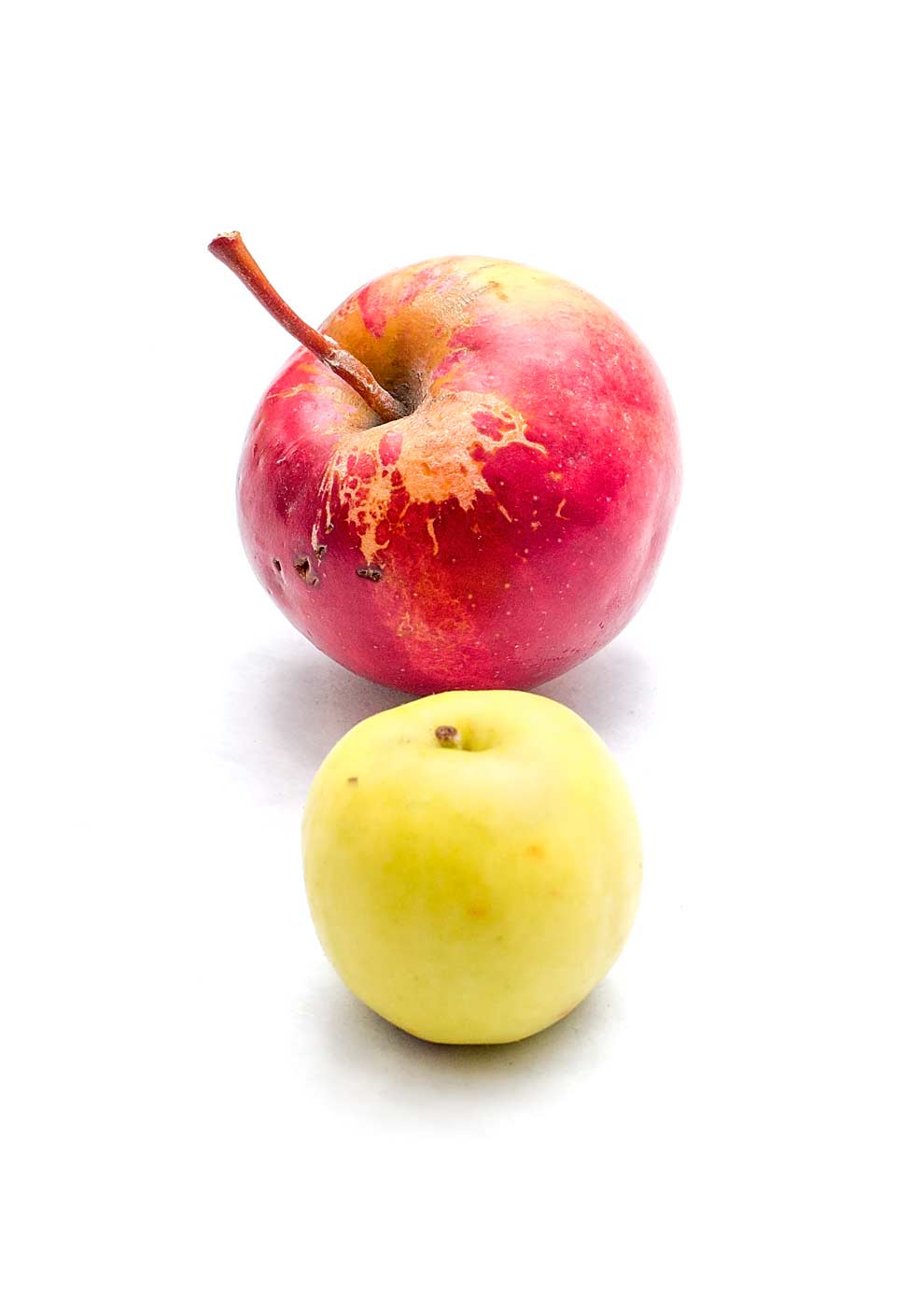
The apple at the bottom originated from one of the Kazakhstani Malus sieversii trees at the Pullman, Washington, Tukey Horticulture Orchard. This mother tree provided several seedlings that fruited three years later. The blush variety above was one of the successful three that yielded well from the start, has good cider making size and has produced good cider from the Washington State University student-led trials. The students affectionately call this new mother “Big Blush.” (TJ Mullinax/Good Fruit Grower)
In 2010, WSU planted copies of the Geneva apple germplasm repository at the Sunrise research orchard near Wenatchee for the established breeding program. Some of the extra trees were planted in Pullman at the Tukey Horticulture Orchard.
They aren’t just typical trees either. They include wild varieties from the hills of Kazakhstan. Some of the trees weep. Some of the fruit has orange flesh.
“We have access to a crazy, crazy amount of different germplasm,” said Tymon James, a senior majoring in integrated plant science.
To capitalize on that genetic diversity in their backyard, Peace convinced seven students in 2014 to take a fruit breeding class and let them choose the goals.
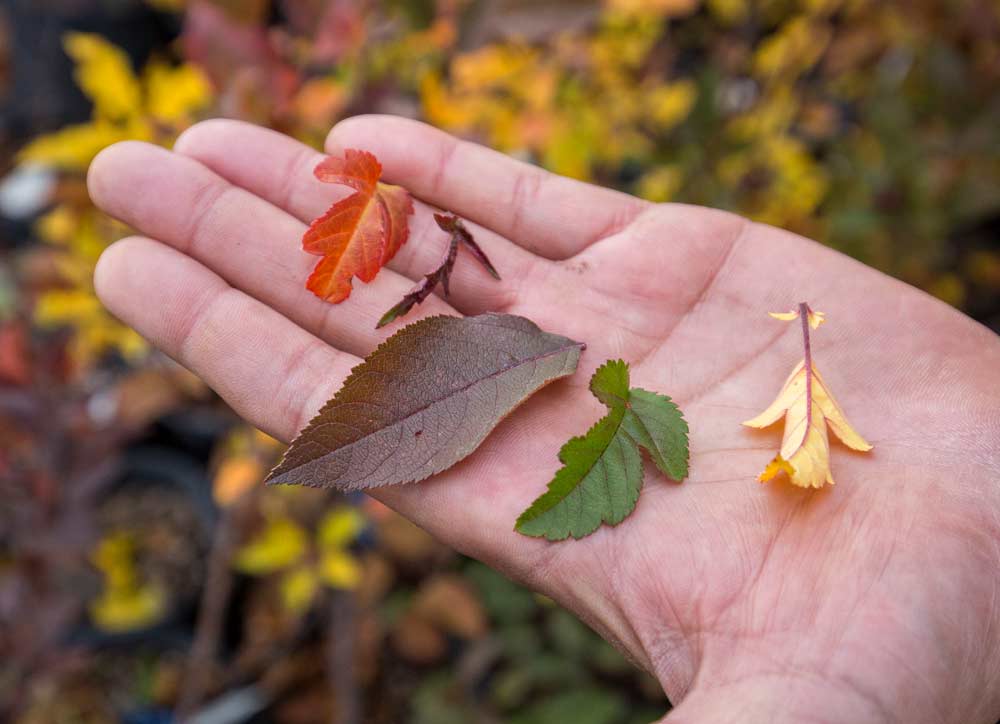
Washington State University researcher Cameron Peace holds several examples of apple tree leaves, showing how varied the trees are within the breeding program. (TJ Mullinax/Good Fruit Grower)
After spitballing ideas — bonsai trees, wood fuel for smoking, potted plants — master’s student Hannah Walters suggested cider apples, an idea unanimously endorsed.
“Because who doesn’t want cider?” she said. Walters now works in research and development for Stemilt Growers in Wenatchee. She and her husband are interested in growing cider apples.
The students then set target characteristics, such as disease resistance, productivity, precocity and the complex, bittersharp and bittersweet, tannin-heavy flavors favored by cider-makers.
The students chose mother trees, picked their fruit, germinated their seeds and propagated seedlings in the greenhouse. Each subsequent spring they make crosses, and along the way, Peace teaches them the use of modern breeding tools, such as DNA-based diagnostics.
Potential impact
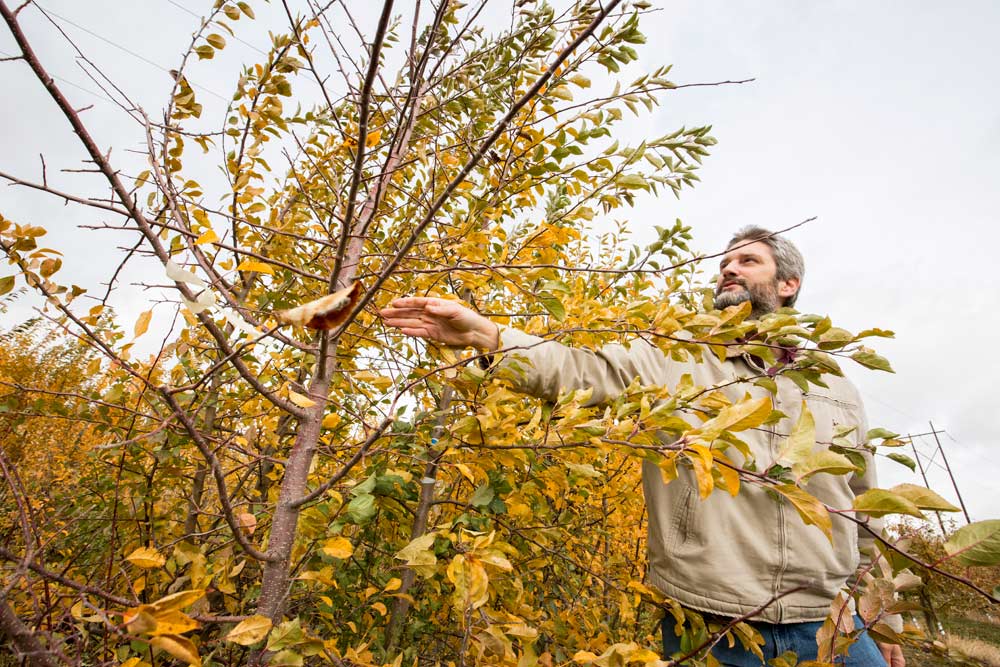
Washington State University researcher Cameron Peace reaches out to show how different some of their WSU bred trees vary. Peace says this is a crab apple type species with small fruit, however the students may use this tree as a parent if it has enough other good attributes. (TJ Mullinax/Good Fruit Grower)
Those students may be onto something, said Tim Steury, an apple grower in Potlatch, Idaho, just across the border from Pullman.
He can think of several hobby cider-makers planting their own trees who might want new flavors or disease resistance. “That certainly makes sense,” said Steury, who produces cider apples for Liberty Cider Co. in Spokane.
Meanwhile, though the cider industry already has a lot of added and infused flavors, more from apples would help, said Peter Ringsrud, co-owner of Snowdrift Cider Co. in Wenatchee.
In fact, he and his son and partner, Lars, do their own searches for new varieties, combing roadsides and abandoned homestead trees for chance seedlings, gathering scion wood to propagate and test in trial blocks to broaden their palette of flavors.
“Even 10 percent of those apples (in a blend) would improve the quality of the cider in the Northwest,” he said.
Not only will more diversity make cider better, it will increase the chances of success for farmers as they spread their financial risk away from just monoculture dessert apples, he said.
A few of Peace’s students, including Walters, reached out to Steury and Ringsrud for advice.
Though nothing like the vast commercial production region of Central Washington, the Palouse has a few small commercial apple orchards that rely on farm markets, U-pick operations and cider apples.
Some heritage varieties, such as Kingston Black and Golden Russett, love the region’s soil and cool, dry climate, he said.
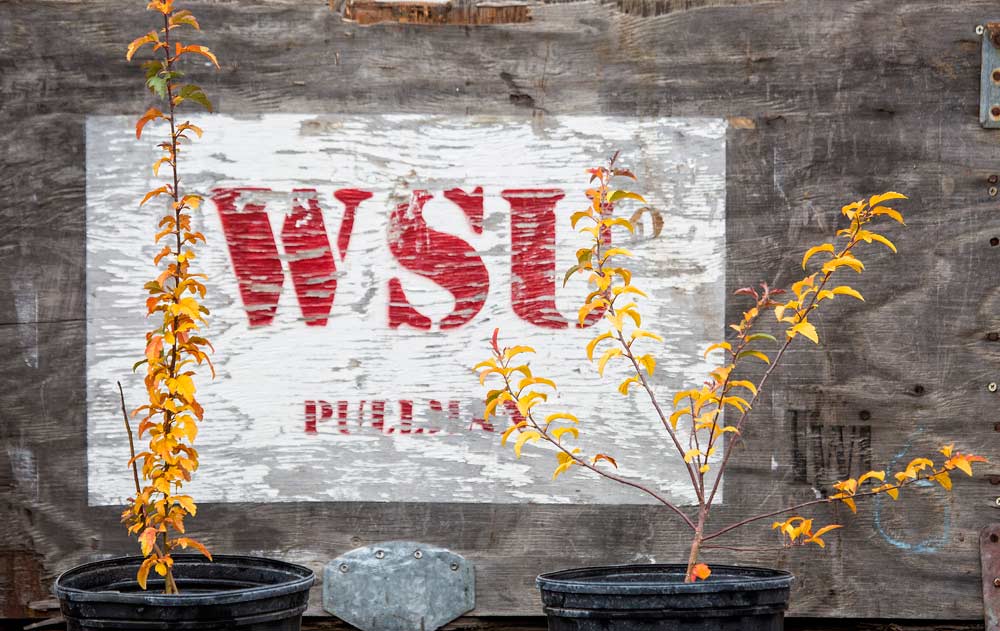
Even trees from the same parents have differences. These two originated from the mother of an M. zumi crab apple and the father of McIntosh Wijcik. However, the one on the left carried its father’s columnar and spur-bearing habit. The sister tree on the right did not and will be discarded from the program. Students will continue to monitor the tree on the left for other desired attributes that come from the mother, like short juvenility and fire blight resistance. (TJ Mullinax/Good Fruit Grower)
Meanwhile, Peace sees benefits beyond just the fruit.
For one, if not for the cider program, students in Pullman would learn only breeding theory. The formal work for dessert apples happens in Wenatchee at the Tree Fruit Research and Extension Center under the direction of breeder Kate Evans.
Those hands-on opportunities are what attracted James, who is applying to graduate school for fruit breeding.
He actually gets to touch the flowers when performing crosses and gets to make mistakes on his sample collections and DNA extractions in a learning environment. “I can make these mistakes in this environment and it’s OK.”
Peace also wants to encourage more young people to learn to grow food and develop a respect for genetic diversity. Peace is the co-director of RosBREED, a national research project looking for ways to improve fruit breeding techniques.
“There are so many jewels in the genome,” Peace said. •
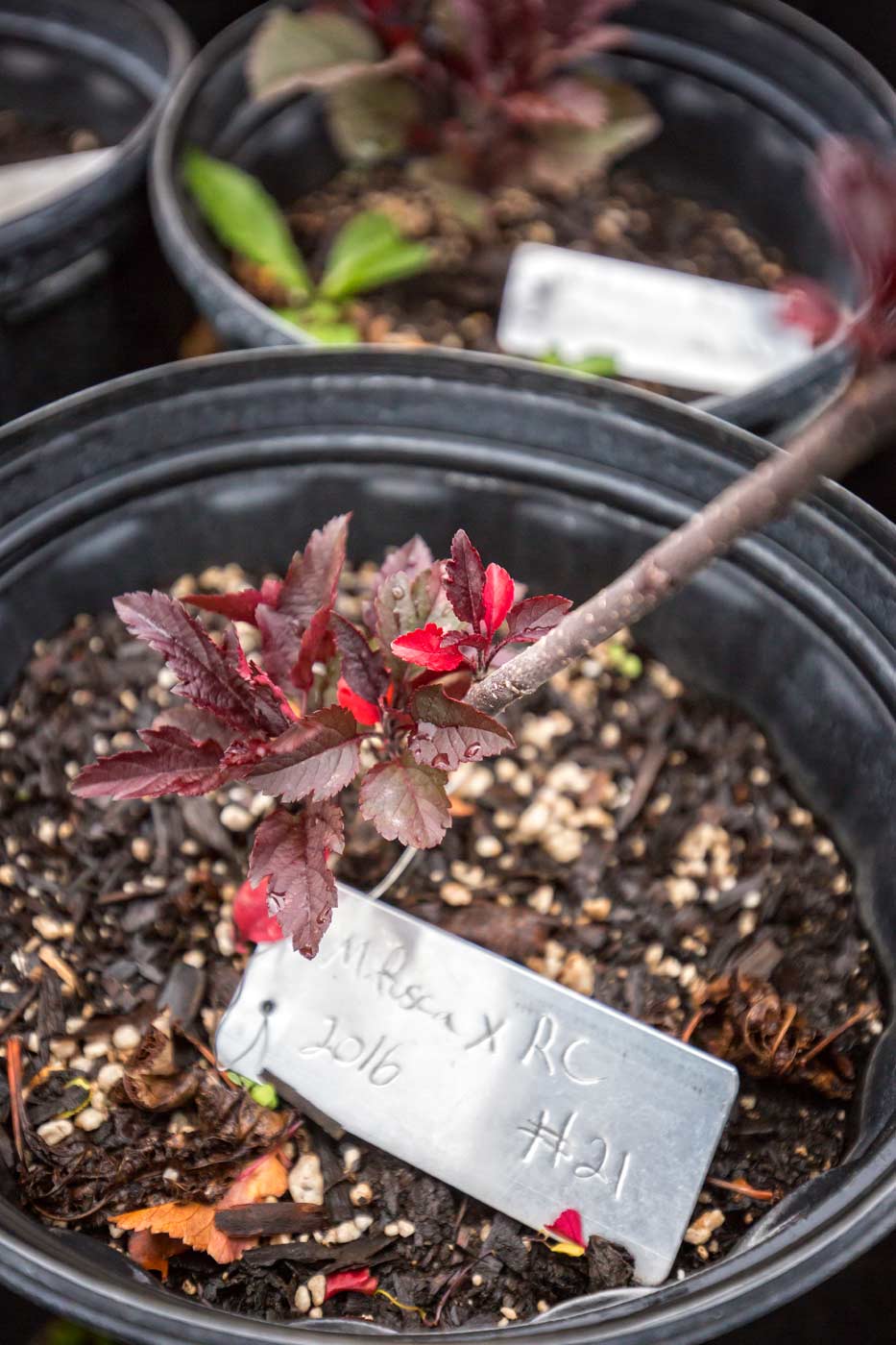
One of the promising apple variety crosses between a M. fusca and Robert’s Crab at the Washington State University Tukey Horticulture Orchard in Pullman, Washington. Students hope the combination of these two will produce a revolutionary new cider for the Northwest that produces a red-fleshed fruit. (TJ Mullinax/Good Fruit Grower)
—by Ross Courtney


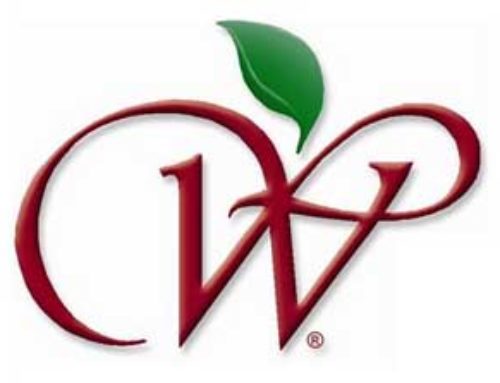



Leave A Comment